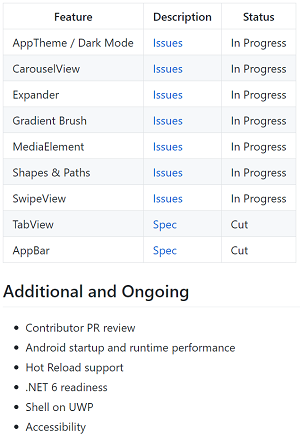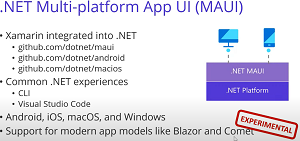News
New Xamarin.Forms 5 Drops Visual Studio 2017 Support
Microsoft announced Xamarin.Forms 5.0, a major release chock full of new functionality and features, but no official support for Visual Studio 2017.
"Updates to Android and iOS are only delivered to Visual Studio 2019, and these are fundamental for getting the latest platform security fixes features required by Apple and Google. Before updating to Xamarin.Forms 5, install Visual Studio 2019," Microsoft says in the release notes for Xamarin.Forms 5, which was officially announced Thursday (Jan. 7).
As far as all of the new features, deleted features and changed features, there are too many to list here, but said David Ortinau, principal program manager, Mobile Developer Tools, summarized the release thusly: "This major release delivers hundreds of quality improvements and brings to stable release new features including App Themes, Brushes, CarouselView, RadioButton, Shapes and Paths, and SwipeView."
Major themes mentioned in the release notes include:
- MasterDetailPage Renamed: MasterDetailPage has been renamed to FlyoutPage.
- RadioButton Changes: RadioButton now supports setting any content and using control templates.
- UIWebView Removed: UIWebView has been completely removed. Since March, Apple has been warning that usage of this control was deprecated and apps would be rejected beginning later in the year.
- C# UI, Expander, and MediaElement Moved: These experimental features have been (or will be soon) migrated to the Xamarin Community Toolkit which everyone should be taking full advantage of.
- DataPages and Themes Packages Removed: In Xamarin.Forms 2, before joining Microsoft, we prototyped some interesting ways to build data driven UIs. These experiments were shipped as preview packages called DataPages and Themes. Since then, we have continued shipping the packages, but no work or customer interest has grown around them. Instead, features such as App Themes are much easier to use and implement dark and light mode, as well as general theme support using dynamic styles. As of Xamarin.Forms 5, we will no longer be building and shipping these packages.
- XFCorePostProcessor.Tasks Removed: This project injects IL to maintain XF 2.5 compatibility. We're far enough away from XF 2.5 now that this weaving should no longer be necessary.
The Xamarin.Forms Feature Roadmap shows the dev team in this release was "Continuing stabilization with a focus on the preview features behind the 'experimental' flag," which are depicted this this graphic, which also shows additional and ongoing initiatives:
 [Click on image for larger view.] Xamarin.Forms 5 Feature Roadmap (source: Microsoft).
[Click on image for larger view.] Xamarin.Forms 5 Feature Roadmap (source: Microsoft).
Note that one of those ongoing initiatives is readiness for .NET 6, a huge, unifying-everything-.NET release that is scheduled for November. Along with .NET 6, Xamarin.Forms will evolve into .NET MAUI (NET Multi-platform App UI)), which adds desktop development to the cross-platform framework that hereto has focused on mobile iOS and Android development.
 [Click on image for larger view.] MAUI (.NET Multi-platform App UI)(source: Microsoft).
[Click on image for larger view.] MAUI (.NET Multi-platform App UI)(source: Microsoft).
"Xamarin.Forms 5.0 will continue to receive service releases through November 2022," Ortinau said. ".NET MAUI will be the next major feature release with previews of .NET 6 shipping early this year. Xamarin.Forms 5.0 apps will migrate to .NET 6 and upgrade directly to .NET MAUI. We look forward to continuing this evolution with you in 2021!"
About the Author
David Ramel is an editor and writer at Converge 360.